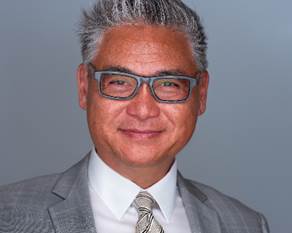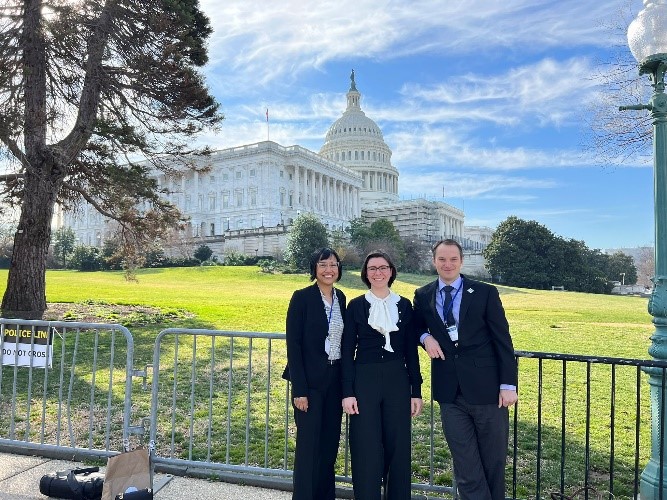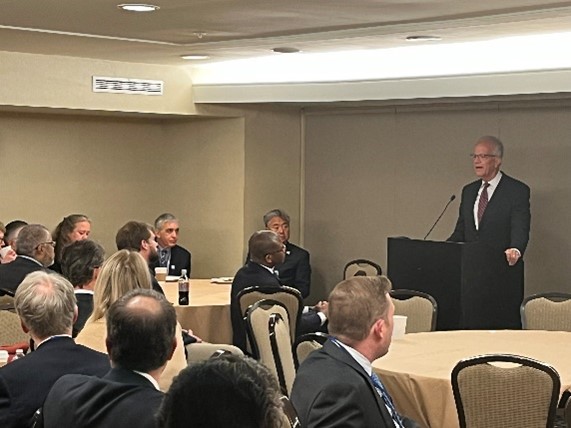March 2022 - AUA Public Policy Council Update for MAS
From the Chair
I am pleased to share updates from the AUA Public Policy Council that may benefit your Section members. Our updates include information on our successful 5th Annual Urology Advocacy Summit and telehealth provisions in the recently passed omnibus spending bill.
2022 Annual Urology Advocacy Summit Recap
Thank you to all who joined us for the 5th AUA Summit in Washington, DC, last week. More than 275 attendees registered for the Summit this year, including over a dozen patient advocates and more than 65 medical students, residents and fellows.
The conference kicked off with Major Garrett as the keynote speaker and attendees went on to participate in 12 educational sessions and hear from four Congressional speakers, including Senators Bill Cassidy, MD, (R-LA) and Jerry Moran (R-KS) and Representatives Mariannette Miller-Meeks, MD, (R-IA-02) and Kim Schrier, MD (D-WA-08). AUA Summit attendees held nearly 205 meaningful conversations with members of Congress and staff. These conversations focused on advocating to ease the specialty physician workforce shortage, make telehealth expansion permanent, diversify clinical trials and reform the Medicare Physician Fee Schedule. The AUA is hearing from attendees and Congressional staff about how they can better support these initiatives. Staff will follow up over the next few weeks to continue reinforcing these key messages.

Women of the AUA Summit

Students, Residents, and Fellows at the AUA Summit
Attendees enjoyed three networking receptions, including Monday night’s Grand Reception at the National Archives Museum. Before the AUA Summit began, we held committee and Council meetings as well as the 2022 Patient Advocacy Connections Program (PACP). The PACP, new to the AUA Summit, allowed patient advocacy organizations to interact with advocacy-minded members of the AUA and other patient groups in the urologic space.
We are also pleased to announce that the AUAPAC surpassed its fundraising goal for the AUA Summit and, thanks to the generosity of AUAPAC donors, raised more than $41,000 for candidates.
Our fantastic attendees appreciated the relevance of the five legislative asks, remarked on “feeling empowered” at the conference, and called it “the best Summit yet.” We hope you will save the date for the 6th Annual Urology Advocacy Summit on February 27 – March 1, 2023, at the Capital Hilton in Washington, DC.

Arizona Delegation

Oregon Delegation
2022 Patient Advocacy Connections Program
Alongside the AUA Summit, the AUA and the Urology Care Foundation hosted the Patient Advocacy Connections Program (PACP). The PACP consisted of a networking event, two roundtables and a “next steps” meeting. Fifteen patient advocacy partner organizations spanning the full range of urologic conditions attended. The first roundtable was titled Amplifying Patient Voices Through Legislative Advocacy and discussion topics included coalition building and collaborating with partner organizations, grassroots advocacy efforts and a presentation on retaining advocates when asks become repetitive from year to year. The second roundtable was entitled Beyond Survivorship: Managing the Holistic Needs of Urologic Patients. In this roundtable participants were split into three groups to discuss invisible/stigmatized conditions, the DIVERSE Trials Act and the mental health needs of urologic patients.
This was the first year that the Patient Advocacy Connections Program was held in conjunction with the AUA Summit. Feedback for the program was overwhelmingly positive. Patient groups thanked the AUA for its determination to include the patient voice and physician participants noted that networking with the patient advocates provided exciting opportunities for collaboration on research and clinical efforts to improve patient care. A formal report summarizing the program will be available in the coming weeks.
The AUA would like to thank the sponsors of the Patient Advocacy Connections Program: Pfizer, Exelixis, Urovant Sciences, Merck, Exact Sciences, Astellas, Advanced Accelerator Applications, Blue Earth Diagnostics, Janssen Pharmaceuticals and Intuitive.

The AUAPAC collected more than $41,000 in donations from domestic members during the 5th AUA Summit. These funds will go directly to support federal candidates, from any party, who care about the policy issues that are critical to urologic specialists and the patients they serve.
In addition, AUAPAC sponsored an Arlington Cemetery tour and subsequent dinner on Saturday night as well as a special breakfast on Wednesday morning for those silver, gold and platinum level donors who gave at the AUA Summit. Senator Jerry Moran (R-KS), who serves as Ranking Member of the Senate Committee on Veterans’ Affairs and member of the Senate Health, Education, Labor & Pensions Committee, was the featured speaker at the event. He spoke on a number of key topics important to urology, including the need to continue improving healthcare for the men and women who served this nation in uniform, and increasing research funding for agencies such as the National Institutes of Health.
Apply Now: Holtgrewe Legislative Fellowship Applications Open
Do you know someone with a keen interest in legislative or policy issues who may be a good fit for AUA’s Holtgrewe Legislative Fellowship? If so, please encourage them to apply for the fellowship today!
The Holtgrewe Legislative Fellowship is designed to prepare and educate urology residents and fellows in the legislative aspects of health policy, providing exclusive opportunities to be involved with the important policy issues impacting urologists and their practices. As part of the program, the Holtgrewe Fellow will have the chance to complete a four- to six-week fellowship with a congressional office in Washington, DC. Throughout the year, they will participate in the 2023 Annual Urology Advocacy Summit, attend the Alliance of Specialty Medicine fly-in event and attend the American College of Surgeons Executive Leadership Program in Health Policy & Management at Brandeis University. The Fellow will also be actively involved in the AUA’s Public Policy Council and provide a legislative update to the Council during the fall meeting.
Completed applications must be received by April 15, 2022, so please share this exciting opportunity now.
Surprise Billing Rule Rebuked by Federal Court
On February 23, a federal court in Texas struck down part of the federal rule stemming from a law banning surprise medical bills. The piece of the rule struck down included the Biden administration’s interpretation of a controversial part of the law, which instructed mediators to give rates insurers and providers contracted with in the past extra weight compared with other factors. The AUA joined the American Medical Association (AMA) in opposing this interpretation through a letter to the administration last fall. The court’s decision aligns with the AMA request in revaluing what factors into an arbitration decision dispute mediation. A copy of the letter to HHS is attached.
Healthcare providers, including the AMA, have filed several lawsuits challenging how the Department of Health and Human Services (HHS) created a mediation process for hospitals and doctors and insurers to settle disputes over out-of-network medical bills. The lawsuit by the AMA has not yet been decided. The Biden administration may appeal the federal court ruling.
AUA Supports Telehealth Waiver Extension in Omnibus Spending Bill
On March 10, Congress passed an omnibus spending bill to fund the government for fiscal year 2022. The bill includes extensions for the current telehealth waivers, including enabling audio-only visits and the elimination on site of service restrictions, through December 31. Prior to the bill’s passage, the waivers had to be reauthorized every 90 days with a renewal of the COVID-19 public health emergency (PHE) declaration. The AUA repeatedly met congressional staff to advocate for a longer authorization for waivers to invite greater investment in telehealth and provide stability for providers and patients alike.
In addition to extending telehealth waivers, the bill will require the Medicare Payment Advisory Commission to conduct a study analyzing the utilization of telehealth services under the Medicare program, telehealth expenditures, and the effects of expanded telehealth coverage on access to care among Medicare beneficiaries.
President Biden signed the bill into law on March 15. The AUA will now focus efforts on making many of these common sense telehealth policies permanent, such as the elimination of the originating site requirement.
ICYMI: Updates from the AUA Policy & Advocacy Brief blog
AUA Urges Congress to Hold Hearings on Medicare Funding
On February 18, the AUA, as part of the Alliance of Specialty Medicine (ASM), sent a letter to Congress to express concerns about structural and mounting instability in the Medicare Physician Fee Schedule (MPFS). The ASM requested that the committees of jurisdiction hold hearings to begin the process of stabilizing and improving Medicare physician reimbursement and performance programs. The letter noted that any legislation to implement the fixes to Medicare financing will be complex and, therefore, hearings should be held as soon as possible.
Funding for inflationary increases in the cost of physician practice have been woefully underfunded relative to inflation and to comparable increases to funding for other practice settings, including the hospital setting, said the specialty medicine groups. This has led to greater practice consolidation and the erosion of physician’s ability to operate their own practices. The letter further notes the combination of cuts, including the budget sequester, PAYGO, and Medicare conversion factor cuts, which would have taken effect had physician groups – including the AUA – not lobbied to have them delayed or eliminated. Please contact AUA Legislative & Political Affairs Vice President Brad Stine at bstine@auanet.org for a copy of the letter.
In addition, on February 25 the AUA joined 96 other medical organizations in a letter to the leadership of the Senate Finance Committee, the House Energy & Commerce Committee and the House Ways & Means Committee acknowledging congressional actions in recent years to mitigate cuts to the Medicare Physician Fee Schedule (MPFS). The letter urges committee leadership to convene hearings, roundtables and other means to identify and discuss potential systemic reforms to the current Medicare payment system. Please contact AUA Policy & Advocacy Director Ray Wezik at rwezik@auanet.org for a copy of the letter.
Congress Releases FY22 CDMRP Funding Levels in Omnibus Spending Bill
On March 10, Congress passed an omnibus spending bill to fund the Congressionally Directed Medical Research Programs (CDMRP) for Fiscal Year 2022. The Prostate Cancer Research Program (PCRP) will receive $110 million, Kidney Cancer Research Program (KCRP) will receive $50 million and the Peer Reviewed Cancer Research Program will receive $130 million. President Biden signed the bill into law on March 15.
The AUA has been heavily involved in advocacy efforts for CDMRP. Last year, the AUA hosted a briefing for Congressional staffers on the importance of funding the CDMRP programs. The AUA has also participated in Hill days for ZERO — The End of Prostate Cancer and KidneyCan, which focused on funding requests for the PCRP and KCRP in addition to the Kidney Cancer Impact Alliance’s (KCIA) Hill day this past September. The AUA has also advocated to lawmakers for the addition of a bladder line item within CDMRP with partner organization Bladder Cancer Advocacy Network (BCAN).
The AUA will continue CDMRP advocacy efforts for Fiscal Year 2023.
Resident Education Deferred Interest Act Officially Introduced in Senate
On February 16, Senators Jacky Rosen (D-NV) and John Boozman (R-AR) introduced the Resident Education Deferred Interest (REDI) Act (S. 3658). Previously, the AUA and 35 other medical specialty groups endorsed the REDI Act prior to its introduction. The bill would allow for medical residents to defer their student loans interest-free while in residency, saving them tens of thousands of dollars in interest. In June 2021, Representatives Brian Babin (R-TX-36) and Chrissy Houlahan (D-PA-06) introduced the House companion, H.R. 4122.
The AUA will continue promoting bills such as the REDI Act and work with like-minded stakeholders to improve the future of the physician workforce.
Senator Rosen’s official press release can be found here.
AUA Seeks Republican Sponsor for the SPARC Act
On February 22-24, the AUA met with staff in the office of Senators John Barrasso, MD, (R-WY) and Roger Marshall, MD, (R-KS) to discuss serving as the Republican sponsor for the Specialty Physicians Advancing Rural Care (SPARC) Act along with Senator Jacky Rosen (D-NV). The AUA also met with staff in the offices of Senators Mike Braun (R-IN) and Richard Burr (R-NC) to revisit the possibility of either Senator serving as the Republican sponsor.
Additionally, on February 23, the AUA met with staff in the office of Representative Larry Bucshon, MD, (R-IN-08) to discuss co-sponsorship of H.R. 944. As you know, Representatives David McKinley (R-WV-01) and Peter Welch (D-VT-AL) introduced this legislation last year. The measure, which essentially is an earlier version of the aforementioned SPARC Act, establishes a loan repayment program to encourage specialty medicine physicians to serve in rural communities experiencing a specialty physician shortage.
For the past two years, the AUA has been hard at work identifying champions in Congress willing to introduce such legislation that will assist with adding more specialty physicians around the country. As a result, the AUA will continue promoting bills such as the SPARC Act and work with like-minded stakeholders to improve the future of the physician workforce.
The AUA has also created a grassroots alert that allows any domestic AUA member to easily contact their federally elected officials to ask them to cosponsor this legislation. Access the action center or simply text AUA to 52886 to get started.
Below are insurance updates from national insurance carriers. If you have questions about insurer issues, contact Raymond Wezik at rwezik@auanet.org
BCBS Federal Employee Plan
BCBS Federal Employee Plan reviewed its Injectable Bulking Agents for the Treatment of Urinary and Fecal Incontinence Policy updating the medically necessary statement for stress urinary incontinence who have failed appropriate conservative therapy to include polyacrylamide hydrogel.
CGS Administrators
CGS Administrators reviewed its Prognostic and Predictive Molecular Classifiers for Bladder Cancer (MolDX) (A58065) Local Coverage Article (LCA) revising the code description for 0016M under the heading CPT/HCPCS Codes Group 1.
CGS Administrators reviewed its ProMark Risk Score (J15) (L36675) Local Coverage Determination (LCD) with the following changes:
- Under Analysis of Evidence (Rationale for Determination) added the Criteria for Coverage that was previously deleted in error.
- Acronyms were inserted where appropriate throughout the LCD. ProMark registered mark was inserted throughout the LCD were applicable.
CGS Administrators issued a new version of its Standard Documentation Requirements for All Claims Submitted to DME MACs (JB, JC) (A55426) Local Coverage Article (LCA) adding the following statement regarding content of beneficiary’s medical record:
- The beneficiary’s medical record must contain sufficient documentation of the beneficiary’s medical condition to substantiate the necessity for the type and quantity of items ordered and for the frequency of use or replacement (if applicable). The information should include the beneficiary’s diagnosis and other pertinent information including, but not limited to, duration of the beneficiary’s condition, clinical course (worsening or improvement), prognosis, nature and extent of functional limitations, other therapeutic interventions and results, past experience with related items, etc.
First Coast Service Options
First Coast Service Options reviewed its Rezum System for Use in the Management of Benign Prostatic Hypertrophy Clarification Regarding the System Technology and Correct Billing (A55477) Policy with the following changes:
- CPT code 53899 was removed and replaced with CPT code 53854 in the article text section.
- CPT Code 53854 was added to the CPT/HCPCS Group 1 Codes section.
Humana
Humana reviewed its Benign Prostatic Hyperplasia (BPH) Treatments Policy with the following changes:
- Changed coverage decision for permanent urethral stent and transurethral needle ablation/radiofrequency needle ablation from may be eligible to may not be eligible under the plan for BPH treatment
- Updated coverage decision for code 53852 from not covered if used to report any treatment outlined in coverage limitations section to not covered
- Revised medically necessary criteria for BPH treatments including prostatic urethral lift (UroLift), transurethral incision of the prostate, water vapor thermal therapy (Rezum system), and waterjet ablation (AquaBeam)
- Revised coverage limitations
- Added comment that code 52282 is not covered if used to report any treatment outlined in coverage limitations section
- Removed deleted code C9747
Humana reviewed its Genetic Testing and Liquid Biopsy for Prostate Cancer Policy stating Genetic Testing and Liquid Biopsy for Prostate Cancer may be considered medically necessary.
Humana reviewed its Urinary Bladder Dysfunction Policy with the following changes:
- Added penile cuff test as experimental/investigational
- Added code 55899 as not covered if used to report any treatment outlined in coverage limitations section
- Revised descriptions for codes including 64581, 90913, 95970
Noridian
Noridian released its draft Plasma-Based Genomic Profiling in Solid Tumors (MolDX) Local Coverage Determination (LCD). A synopsis of the draft is as follows:
- Guardant360 may be considered when all criteria are met. Criteria include but are not limited to requiring that the member has been diagnosed with a recurrent, relapsed, refractory, metastatic, or advanced solid tumor that did not originate from the central nervous system and has not previously been tested with the Guardant360 test for the same genetic content. Members that have been tested previously using Guardant360 for cancer may not be tested again unless there is clinical evidence that the cancer has evolved wherein testing would be performed for different genetic content.
- Member must also be untreated for the cancer being tested, or not be responding to treatment (e.g., progression or new lesions on treatment), and has decided to seek further cancer treatment with the following conditions: the member is a candidate for further treatment with a drug that is either FDA-approved for that member’s cancer, or has a National Comprehensive Cancer Network (NCCN) 1 or NCCN 2A recommendation for that member’s cancer; the FDA-approved indication or NCCN recommendation is based upon information about the presence or absence of a genetic biomarker tested for in the Guardant360 assay; and tissue-based, comprehensive genomic profiling (CGP) is infeasible (e.g., quantity not sufficient for tissue-based CGP or invasive biopsy is medically contraindicated) or specifically in NSLC Tissue-based CGP has shown no actionable mutations.
Noridian reviewed its Prognostic and Predictive Molecular Classifiers for Bladder Cancer (MoIDX) (JE) (A58181) Local Coverage Article (LCA) revising the description for 0016M. The revision is due to the 2022 Annual CPT/HCPCS Code Update, effective January 1.
Noridian issued a new version of its Standard Documentation Requirements for All Claims Submitted to DME MACs (JB, JC) (A55426) Local Coverage Article (LCA) adding the following statement regarding content of beneficiary’s medical record:
- The beneficiary’s medical record must contain sufficient documentation of the beneficiary’s medical condition to substantiate the necessity for the type and quantity of items ordered and for the frequency of use or replacement (if applicable). The information should include the beneficiary’s diagnosis and other pertinent information including, but not limited to, duration of the beneficiary’s condition, clinical course (worsening or improvement), prognosis, nature and extent of functional limitations, other therapeutic interventions and results, past experience with related items, etc.
Novitas
Novitas reviewed its Biomarkers for Oncology (JH, JL) (A52986) Local Coverage Article (LCA) with the following changes:
- Tier 2 codes 81400 thru 81405 have been removed from the CPT code ‘Group1’.
- Billing & coding instructions specific for the Tier 2 codes have been removed from the article along with formatting changes throughout the article.
Palmetto
Palmetto reviewed its Prognostic and Predictive Molecular Classifiers for Bladder Cancer (MolDX) (JJ, JM) (A58028) Local Coverage Article (LCA) revising the code description for 0016M under the CPT/HCPCS Codes Group 1 heading.
United Healthcare
United Healthcare reviewed its Bilateral Procedures (Professional) (Individual Exchange) Reimbursement & Billing Document adding links to attachments for:
Codes with bilateral in the description policy list – This is a list of codes with the term bilateral in the code description that would not allow modifier 50 or modifiers LT and RT to be reported for the same date of service.
Codes with unilateral or bilateral in the description policy list – This is a list of codes with the terms unilateral or bilateral in the code description that would not allow modifier 50 or modifiers LT and RT to be reported for the same date of service.
United Healthcare reviewed its DME, Orthotics, and Prosthetics (Professional) (Individual Exchange) Reimbursement & Billing Document adding the following applicable states:
- Alabama, Arizona, Florida, Georgia, Illinois, Louisiana, Maryland, Michigan, North Carolina, Oklahoma, Tennessee, Texas, Virginia and Washington.
United Healthcare revised its DME, Orthotics, and Prosthetics (Professional) (Individual Exchange) – Reimbursement & Billing Document clarifying it is applicable only to the following states:
- Alabama, Arizona, Florida, Georgia, Illinois, Louisiana, Maryland, Michigan, North Carolina, Oklahoma, Tennessee, Texas, Virginia, and Washington
United Healthcare reviewed its Evaluation and Management (Professional/Individual Exchange) Reimbursement & Billing Document adding risk of complications and/or morbidity or mortality of patient management to medical decision-making criteria.
United Healthcare reviewed its Incontinence Control Devices (Medicare Advantage) Policy adding:
- Adding inFlow continued coverage criterion indicating claims after date of service April 1, 2021 must use HCPCS code A4335
- Adding inFlow continued coverage criteria for use of KX modifier coding
- Adding documentation requirements to coverage criteria
- Adding HCPCS code A4335
- Adding modifier coding
- Removing HCPCS codes K1010, K1011, K1012
WPS Government Health Administrators
WPS Government Health Administrators issued a new version of its Prostate Cancer Genomic Classifier Assay for Men with Localized Disease (MolDX) (J05, J08) (L38433) Local Coverage Determination (LCD).
WPS Government Health Administrators issued a new version of its Prostate Cancer Genomic Classifier Assay for Men with Localized Disease (MolDX) (J5, J8) (A57106) Local Coverage Article (LCA).
Local and Regional Updates
The following are updates in your Section. The AUA routinely monitors state legislative, regulatory, and insurance policy trends. Please contact AUA State Advocacy Manager Catherine Hendricks at chendricks@AUAnet.org for more information on any of these issues.
Texas Transgender Action
Texas Governor Greg Abbott (R) ordered the state’ Department of Family and Protective Services (DFPS) to “conduct a prompt and thorough investigation” of any instances of sex-change procedures in children and investigate the parents of such children and requires “other state agencies to investigate licensed facilities where such procedures may occur,” saying such procedures constitute child abuse under Texas law. Also, if a professional (teachers, doctors, nurses, etc.) has cause to believe a child has been abused, they must report to the DFPS within 48 hours. Failure to report is a criminal offense.
District Judge Amy Clark Meachum ruled on March 11, 2022, that providing gender-affirming care is not a reason for the state to investigate a family for child abuse, and halted all such investigations. The statewide injunction from District Judge Amy Clark Meachum will remain in effect until “this court, and potentially the Court of Appeals, and the Supreme Court of Texas” hear the case, she said. Meachum said there is a “substantial likelihood” that lawyers for the American Civil Liberties Union and Lambda Legal will prevail in getting Gov. Greg Abbott’s directive for such investigations permanently overturned, calling his actions “beyond the scope of his duty and unconstitutional.”
The AUA is committed to providing access to a safe and inclusive healthcare space to support the well-being of all youth who identify as transgender or intersex/DSD and to the principle that medical decision-making for intersex/DSD and transgender children is the responsibility of parents acting in their child’s best interest to ensure their health, safety and well-being, after consultation with medical professionals and education via medically safe (respected, peer-reviewed) resources, and must not be legislated. AUA members are also committed to ensuring their patients and families receive the best possible individualized medical care for each patient, which includes establishing and working with care teams comprising a variety of experts to provide patients, and their families, with the best options for both support and successful outcomes.
States Debate What is an Associate or Assistant Physician
In order to address the workforce shortages, several states have created a new licensure category—associate or assistant physician. Missouri, Arkansas and Utah already have laws on the books and many other are looking to introduce bills. Virginia recently introduced Senate Bill 676, creating the licensure of associate physicians. The AUA’s State Advocacy Committee will monitor the progress of this bill and other bills as they are introduced.
APs are allopathic or osteopathic medical school graduates who have not completed an accredited postgraduate residency; however, they must have passed either Step 1 and Step 2 of the USMLE (or the equivalent from a board-accredited examination), the Comprehensive Osteopathic Medical Licensing Examination, or the COMLEX and meet fairly standard requirements for licensure depending on the state in which he or she plans to practice in.
Like a nurse practitioner or physician assistant, the AP’s scope of practice depends on the state. In states that have passed AP legislation, APs are required to be supervised by a collaborating physician. Within the collaboration agreement, APs can be given the authority to administer or dispense drugs and provide treatment consistent with their skills, training, and competence. In some states, APs can also prescribe controlled substances.
Delaware
Highmark BCBS Delaware
Highmark BCBS Delaware reviewed its Prostate Specific Antigen (DE Commercial) Policy replacing “for any other condition not stated above” with “not meeting the criteria as indicated in this policy” in not medically necessary policy statement.
District of Columbia
D.C. B. 24-0655 – Insurance
Introduced by Councilmember Mary Cheh (D), D.C. B. 24-0655 sets reasonable timelines for insurers to respond to prior authorization requests and appeals, and lays out the qualifications of personnel qualified to make these determinations. The bill was referred to the Council Health Committee.
D.C. B 24-0683 – Medical Business
Introduced by Councilmember Elissa Silverman (I), amends when the ban on non-compete agreements applies from March 16, 2021 to October 1, 2022. The bill was referred to the Office of the Secretary.
DC B 24-0684 – Medical Business
Introduced by Councilmember Elissa Silverman (I), amends when the ban on non-compete agreements applies from March 16, 2021 to October 1, 2022. The bill was referred to the Office of the Secretary.
Pennsylvania
Independence Blue Cross
Independence Blue Cross reviewed its Experimental/Investigational Services (Medicare Advantage) Policy with the following changes:
- Codes 0550T, 0588T, 53453, 53454 have been added to Attachment A of this policy.
The following codes have been termed and have been removed from Attachment A of this policy and are replaced by the following codes in Attachment A:
- Removed: 0548T, replaced with: 53451
- Removed: 0549T, replaced with: 53452
Independence Blue Cross reviewed its National Correct Coding Initiative (NCCI) Code Pair Edits (Medicare Advantage) Reimbursement & Billing Document adding the following required documentation:
- The individual’s medical record must reflect the medical necessity for the care provided. These medical records may include, but are not limited to records from the professional provider’s office, hospital, nursing home, home health agencies, therapies, and test reports.
- The Company may conduct pre-payment reviews and post-payment audits of services to our members, regardless of the participation status of the provider. All documentation is to be available to the Company upon request. Failure to produce the requested information may result in a denial for the service.
Independence Blue Cross reviewed its Multiple Procedure Payment Reduction (MPPR) on Certain Diagnostic Services (Commercial) Reimbursement & Billing Document with the following changes:
- Added CPT code 0697T.
- Updated CPT code 0648T with respect to narrative revisions.
Maryland
H.B. 961 – Scope of Practice
Introduced by Delegate Ken Kerr (D), H.B. 961 requires a physician assistant to practice under a collaboration agreement with a signing physician rather than under a delegation agreement with a primary supervising physician; repeals the sections of law governing the delegation of prescribing, dispensing, and administering controlled dangerous substances, prescription drugs, and medical devices; and expands the provision of certain services. The bill was referred to the House Health and Government Operations Committee.
H.B. 1252 – Medical Licensure
Introduced by Delegate Lisa Belcastro (D), H.B. 1252 repeals obsolete sections of the licensure law regarding fees, criminal history background checks, and Board notification requirements; amends the license educational, training, and examination qualifications; out-of-state licensure requirements; and investigation and license discipline. The bill was referred to the House Health and Government Operations Committee.
S.B. 808 – Scope of Practice Withdrawn by Sponsor
Introduced by Senator Mary Beth Carozza (R), S.B. 808 requires a physician assistant to practice under a collaboration agreement with a signing physician rather than under a delegation agreement with a primary supervising physician; repeals the sections of law governing the delegation of prescribing, dispensing, and administering controlled dangerous substances, prescription drugs, and medical devices; and expands the provision of certain services. The bill was withdrawn by Senator Carozza.
S.B. 972 – Medical Licensure
Introduced by Senator Ed Reilly (R), S.B. 972 makes minor edits to provisions of the medical practice act regarding fees and disciplinary actions; application for licensure requirements; contract with an entity to for peer review of disciplinary allegations against a physician; and authorizes the board to regulate the allied health committee. The bill was referred to the Senate Rules Committee.
New Jersey
- 2075 – Medical Business
Introduced by Assemblymember Jay Webber (R), A. 2075 seeks to encourage physicians to provide their professional services without receiving compensation to more than 10 percent of their patients. In return for the provision of uncompensated care and treatment, the bill establishes a $250,000 cap on noneconomic damages for a physician’s entire professional medical practice. With a limited malpractice liability risk, the physician will be subject to a reduced medical malpractice insurance premium. The bill was referred to the Assembly Judiciary Committee.
- 2083 – Medical Business
Introduced by Assemblymember Jay Webber (R), A. 2083 caps noneconomic damages in medical malpractice actions at $250,000. The bill was referred to Assembly Judiciary Committee.
- 2103 – Medical Business
Introduced by Assemblymember Nancy Munoz (R), A. 2103 provides an insurer shall not increase the premium of any medical malpractice liability insurance policy based on a claim of medical negligence or malpractice against an insured unless the claim, as defined, results in a medical malpractice claim settlement, judgment, or arbitration award against the insured. The bill was referred to the Assembly Financial Institutions and Insurance Committee.
- 2104 – Medical Business
Introduced by Assemblymember Nancy Munoz (R), A. 2104 bill allows a health care provider to hold their primary residence, exempt from attachment, execution, and forced sale in any judgment resulting from a medical malpractice action. The bill was referred to the Assembly Judiciary Committee.
- 2193 – Telehealth
Introduced by Assemblymember Nancy Munoz (R), A. 2193 require a health care professional engaged in telemedicine to make a good faith effort to directly activate and coordinate with emergency care services in accordance with the standard of care upon determining the patient is in need of emergency services. A healthcare professional engaging in telemedicine is to make a good faith effort to: provide the name and location of the patient to emergency services in oral and written form; determine the location of a patient if a patient is unaware of his or her location; and provide his or her contact information to emergency services. The bill was referred to the Assembly Health Committee.
- 2795 – Prostate Cancer
Introduced by Assemblymember Herb Conaway (D), A. 2795 seeks to require health insurance carriers to require no cost-sharing prostate cancer screening. The bill has not yet been referred to a committee.
- 3239 – Medical Business
Introduced by Assemblymember Pam Lampitt (D), A. 3239 requires a plaintiff to obtain an affidavit of merit in a malpractice action. The bill was referred to the Assembly Judiciary Committee.
- 3488 – Telehealth
Introduced by Assemblymember Ron Dancer (R), A. 3488 requires a health care facility obligated by federal or state law to provide language interpretation services to patients who are not proficient in the English language or patients who are deaf or hard of hearing, the health care facility is to provide the required language interpretation services regardless of whether the health care facility is engaged in telehealth or in-person treatment. The bill was referred to the Assembly Health Committee.
- 1410 – Medical Business
Introduced by Senator Joseph Cryan (D), S. 1410 places certain limitations on restrictive covenants. Under the bill, an employer may require an employee enter into a restrictive covenant as a condition of employment or with respect to severance pay. A restrictive covenant is enforceable to the extent that it meets the certain requirements. The bill was referred to the Senate Labor Committee.
- 1494 – Diversity, Equity, and Inclusion
Introduced by Senator Vin Gopal (D), S. 1494 establishes the nine-member New Jersey Task Force on Health Care Services for Lesbian, Gay, Bisexual, Transgender, Queer or Questioning, and Intersex Persons in the Department of Health (DOH). The purpose of the task force would be to develop and issue recommendations concerning the health care service needs of the State’s LGBTQI community. The bill was referred to the Senate Health, Human Services and Senior Citizens Committee.
- 1794 – Insurance
Introduced by Senator Vin Gopal (D), S. 1794 requires a utilization review (UR) entity to make certain disclosures regarding its prior authorization (PA) requirements and restrictions, on its website and in writing; if a UR entity requires PA of a covered service, the UR entity shall make a PA and notify the enrollee and the health care provider of the PA within two business days (one business day for an urgent health care service) of obtaining all necessary information to make the PA; and prohibits a UR entity from: requiring an enrollee to participate in a step therapy protocol; requiring a health care provider first obtain a waiver, exception, or other override when deeming a step therapy protocol to not in enrollee’s best interests; or penalizing a health care provider for issuing a prescription, performing a procedure, or performing a test that may conflict with the step therapy protocol of the carrier. The bill was referred to the Senate Commerce Committee.
- 2253 – Medical Business
Introduced by Senator Nick Scutari (D), S. 2253 revises the requirements concerning the fees charged for professional treatment and billing records reducing the current per-page fee cap of $200 to $50, regardless of the method used to store the record; revises the authorized fee of up to $10 per search for of patient treatment and billing records to no more than $20 per request, no search fee is to be charged to a patient requesting their own records. The bill was referred to the Senate Health, Human Services and Senior Citizens Committee.
West Virginia
H.B. 4021 – Student Loans
Introduced by Representative Chuck Horst, H.B. 4021 amends the Medical Student Loan Program authorizing medical schools to make loans; authorizing the use of special revolving funds for program use; establishing eligibility requirements; setting maximum loan amount; requiring an agreement for persons participating; requiring persons participating to select service commitment area; establishing repayment obligation for those participants who do not satisfy commitment obligation; and establishing school reporting requirements. The bill was referred to the House Finance Committee.
H.B. 4634 – Medical Licensure
Introduced by Representative Paul Espinosa (R), H.B. 4634 provides an application method for persons with a valid license in another state to be licensed in West Virginia and outlines the criteria. The bill was referred to the House Government Organization Committee.
S.B. 660 – Telehealth
Introduced by Senator Mike Azinger (R), S.B. 660 requires a patient visit an in-person health care professional within 12 months of using an initial telehealth service. The bill was referred to the Senate Judiciary Committee.
Best regards,
Kathy and the AUA Public Policy & Advocacy Team
